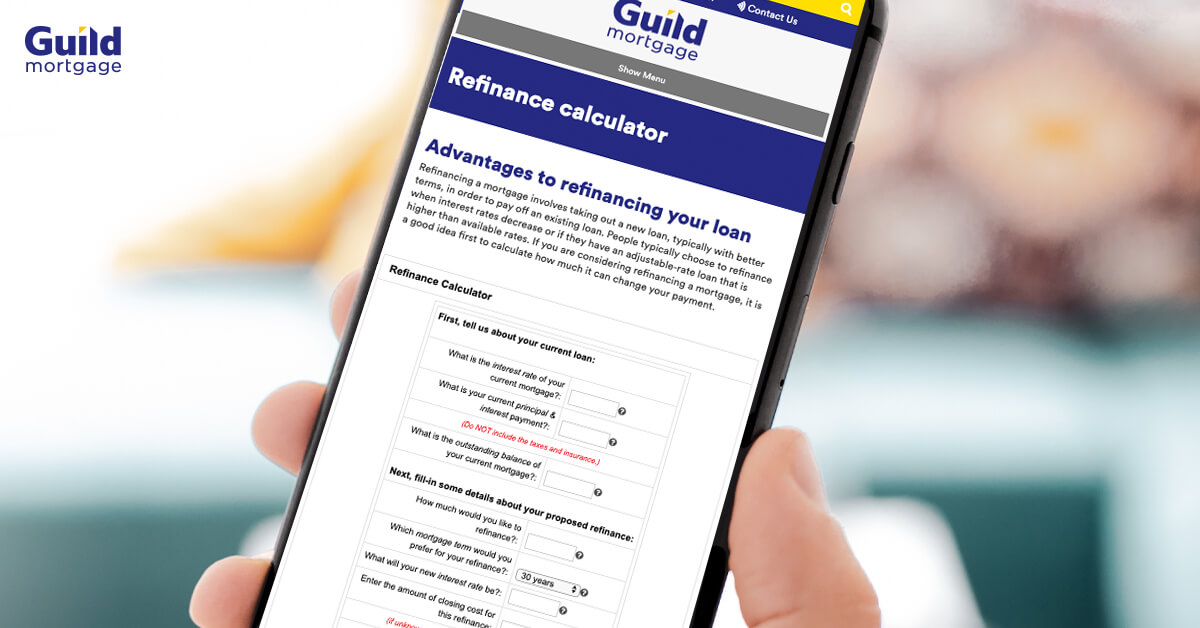Refinance calculator
Use the refinance calculator to see if you can benefit by refinancing your mortgage
Refinancing a mortgage involves taking out a new loan, typically with better terms, in order to pay off an existing loan. People typically choose to refinance when interest rates decrease or if they have an adjustable-rate loan that is higher than available rates. If you are considering refinancing a mortgage, it is a good idea to first use the refinance calculator to see how much it can change your payment.
Refinance Calculator
Results
How does the refinance calculator work?
To calculate your refinancing results, we use information about your current home loan and details of the new loan to estimate potential savings. That way you can decide if refinancing will help you meet your financial goals.
- Current interest rate–this is the rate on your current loan. If you have a second mortgage, just use the interest rate from your first one
- Current principal and interest payment–the amount you pay monthly minus taxes and insurance. Be sure to check your monthly statement and enter just the principle and interest amount
- Outstanding balance–the amount of principal that you have left to pay off
- Amount to refinance–the total that you would like to refinance, including any cash-out amounts that you plan to add on
- Cash-out refinance—the borrower takes out more than the amount due on their existing mortgage. Generally, the borrower needs at least 20% equity in their property to be eligible. Keep in mind that there will be additional fees incurred. To put it simply, those who decide to take a cash-out refinance are turning built-up equity into available cash. Some borrowers use that money for home improvements while others use it for medical expenses, paying off credit card debt or other urgent needs. It can also be used to pay off credit cards or other high interest debts
- Preferred mortgage term–the term you would like to have on your new loan (15-year, 20-year, 30-year, etc.)
- New interest rate–the interest rate expected on your new loan
- Closing cost–the expenses you will need to pay in connection with refinancing. Fees may include origination fee or points, appraisal fee, settlement agent fee, title fee and recording fee. The average cost is 2.5% of your refinance amount. If unsure, you can assume 2.5%
- Break-even point–how long it’ll take for the amount you will save to outweigh the cost. If you plan to sell your home before this time, it wouldn’t make sense to refinance
- Lifetime savings–the estimated amount you’ll save on interest over the life of your new loan
Who benefits from a mortgage refinance?
There are many common reasons to consider refinancing your mortgage. If you fall into one of the groups below, try using the refinance calculator to determine if this is the right choice for you:
- Lower interest rate—if you closed your loan during a period of high interest rates that have since decreased, a refinance may be advantageous for you
- Switch mortgage types—if you’re considering switching from adjustable-rate mortgages (ARMs) to a fixed-rate mortgage to lock in a lower rate for the remaining life of the loan. This is especially helpful in times of economic volatility
- Improved credit score—if your credit score has improved recently, you might be eligible for a more favorable interest rate.
- Cash out – if you are considering debt consolidation or making home improvements and have enough equity in your home, cash-out refinance may be appropriate for you. Cash-out refinance taps into your equity by refinancing into a larger loan amount than you currently owe. The extra money borrowed is your cash out.
- Pay off loan faster–this can result in a higher monthly mortgage payment, but if you can afford it, a refinance can shorten your existing loan terms

